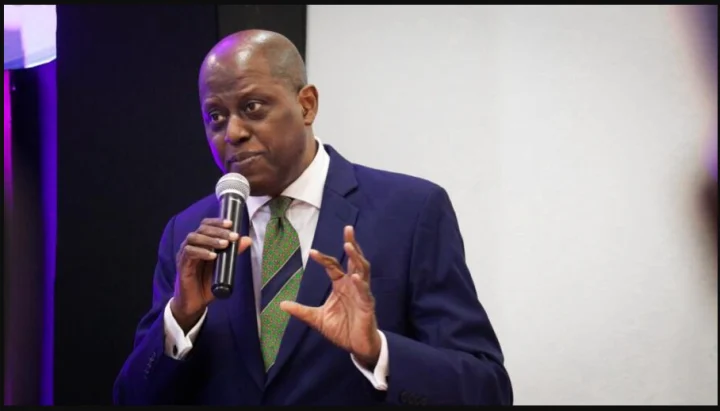The Governor of the Central Bank of Nigeria (CBN), Dr. Olayemi Cardoso, has said that the steady rise in Nigeria’s foreign exchange reserves is the result of deliberate efforts by the apex bank to clear outstanding foreign exchange (FX) backlogs and entrench transparency in the management of the country’s currency market. He said these reforms have not only improved investor confidence but have also contributed to stabilising the naira and strengthening the country’s external reserves.
Speaking during a recent briefing in Abuja, Cardoso stated that the CBN has made significant progress in restoring confidence in the foreign exchange market through consistent policy actions aimed at addressing distortions that accumulated over the years. He explained that clearing verified FX backlogs owed to foreign airlines, manufacturers, and portfolio investors has removed a major constraint that had previously deterred foreign participation in the Nigerian economy.

The Governor noted that the full settlement of these backlogs sent a strong signal to international investors and trading partners that Nigeria is now committed to market integrity and transparency. According to him, the CBN has adopted a rule-based system in managing FX inflows and outflows, ensuring that all legitimate claims are processed through verified channels. This, he said, has resulted in improved liquidity in the market and a gradual rebound in external reserves.
Cardoso revealed that Nigeria’s foreign reserves have shown steady growth in recent months, reflecting renewed investor confidence and improved capital inflows from remittances, exports, and portfolio investments. He attributed part of the gains to reforms that unified the multiple exchange rate windows, allowing the naira to be more reflective of market dynamics. By doing so, he said, the apex bank has eliminated arbitrage opportunities that previously drained the reserves and encouraged speculative trading.
He further emphasized that the CBN’s strategy is anchored on transparency and data integrity. In the past, opacity in FX management often created room for manipulation, but the new approach ensures that market participants have access to timely and accurate information. The bank now publishes periodic data on transactions and reserves to promote accountability. Cardoso explained that the era of hidden charges and unverified allocations in the FX market has ended, as the bank continues to sanitize the system and enforce discipline among authorized dealers.
The CBN governor also highlighted the role of the recent foreign exchange reforms in attracting foreign direct investment (FDI) and foreign portfolio inflows. He said foreign investors who had previously exited the market due to uncertainty are beginning to return, as confidence in the CBN’s policy direction grows. He added that the successful clearance of verified FX backlogs owed to foreign companies in sectors such as aviation and manufacturing has improved Nigeria’s international reputation and strengthened relationships with global financial institutions.
According to him, the apex bank’s monetary policy measures, including tighter liquidity management, have helped to moderate inflation and stabilize the exchange rate. He said the CBN’s collaboration with fiscal authorities has been instrumental in coordinating policy efforts to promote price stability, economic growth, and improved external balance. The bank’s interventions, he said, are designed not only to stabilize the currency but also to support the productive sectors of the economy through targeted credit schemes and financing for small and medium enterprises.
Cardoso also mentioned that the CBN has intensified monitoring of commercial banks and other financial institutions to ensure compliance with foreign exchange regulations. He noted that recent audits and enforcement actions have helped curb illicit transactions, round-tripping, and other sharp practices that undermine the integrity of the financial system. The central bank, he said, will continue to take decisive measures against any institution or individual found engaging in activities that distort the FX market or exploit regulatory loopholes.
While acknowledging that challenges remain, particularly with respect to speculative pressures and global market uncertainties, Cardoso assured that the CBN remains resolute in sustaining policy consistency. He added that the bank is focused on building a transparent, investor-friendly environment that will enhance the inflow of foreign capital and strengthen the economy’s resilience to external shocks.
The governor expressed optimism that the ongoing reforms will yield long-term benefits, including a stronger naira, higher reserves, and greater macroeconomic stability. He called on Nigerians to support the CBN’s efforts by maintaining confidence in the banking system and discouraging panic-driven demand for foreign currencies.
Economic analysts have also lauded the CBN’s recent achievements, noting that the clearance of FX backlogs has eased pressure on businesses and improved liquidity in the foreign exchange market. They observed that the increased transparency in FX transactions has restored credibility to Nigeria’s monetary policy framework and encouraged more investors to engage with the country’s financial markets.
Cardoso reaffirmed that the CBN will maintain its current reform trajectory and will not revert to past practices that fueled distortions in the FX market. He stressed that the central bank’s commitment to transparency, accountability, and market discipline remains unwavering, as these principles are vital to sustaining the gains already recorded. He concluded by assuring that the apex bank will continue to collaborate with stakeholders across sectors to deepen reforms, promote stability, and ensure that the benefits of sound monetary management translate into tangible improvements in the economy and the welfare of Nigerians.
Support InfoStride News' Credible Journalism: Only credible journalism can guarantee a fair, accountable and transparent society, including democracy and government. It involves a lot of efforts and money. We need your support. Click here to Donate
